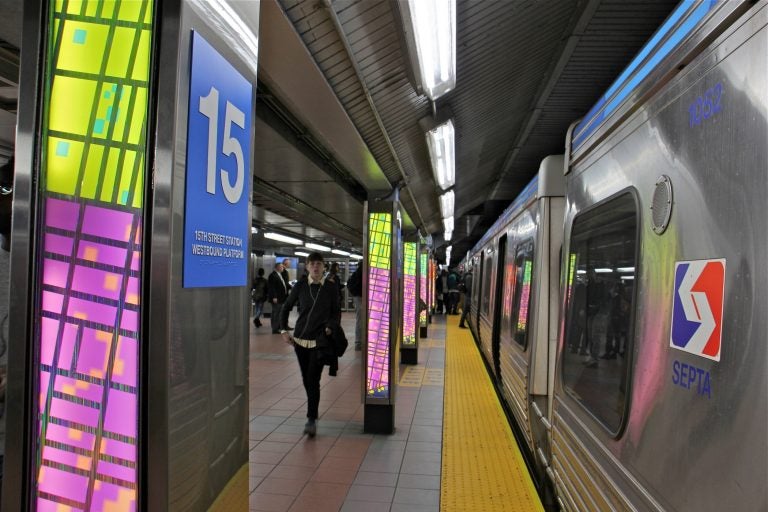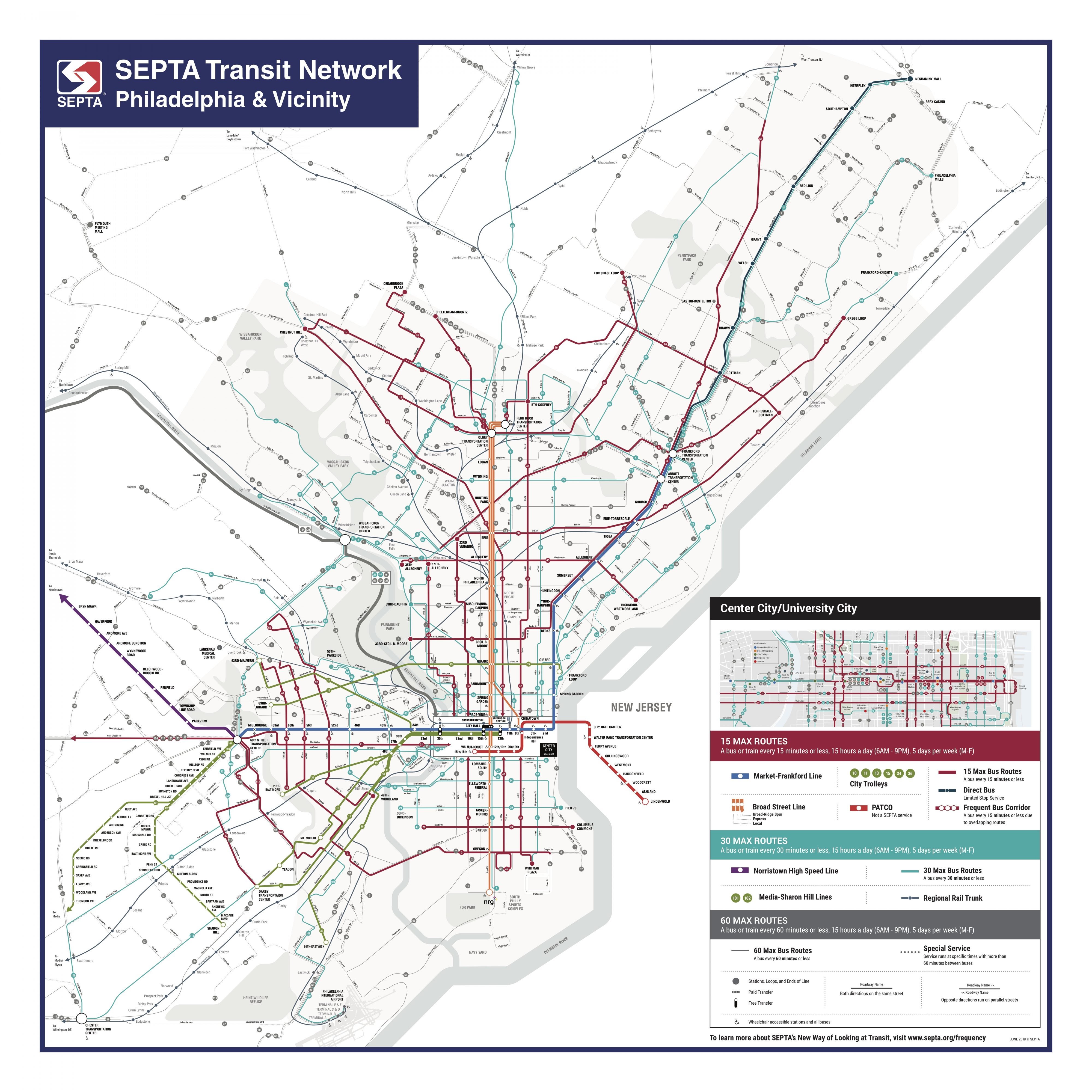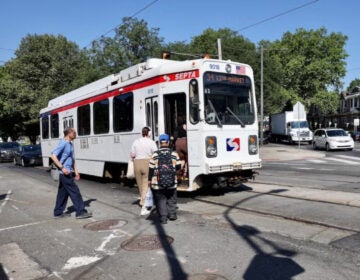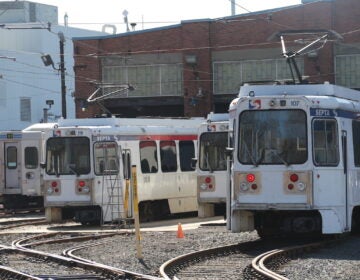SEPTA in the rearview: What Philly’s transit agency got done in 2019
The transit agency weathered unexpected disruptions in 2019. A look back at the year that was.

Ray King's artwork illuminates the platform of the revamped 15th Street Station. (Emma Lee/WHYY)
Transit was short for transit-ions in 2019 Philadelphia.
SEPTA general manager Jeff Knueppel announced his retirement in August after more than 30 years with the transportation authority, the last four as head honcho overseeing daily operations. Knueppel said he made the decision because he wanted to spend more time with his family.
Knueppel led the agency through the troubled SEPTA Key rollout, a series of big infrastructure projects, and a few brutal weather events indicative of climate change’s threats. Taking over those challenges in 2020 is former PennDOT Secretary Leslie Richards, a Penn-educated urban planner who will bring an urbanist perspective and ties to Harrisburg. Taking over for Richards: PennDOT’s former second-in-command, Yassmin Gramian. Like Richards, Gramian knows Philadelphia well and told PlanPhilly that she “sees a bright future” for the city” — especially where transit infrastructure and growth are concerned.
As transportation officials play musical chairs, it may be only a matter of time before SEPTA’s board does as well. The recent 2019 elections flipped the Republican strongholds of Delaware, Bucks, and Chester counties to Democrat. That means the county leaderships have the power to appoint board members who may lean a little to the left when it comes to decisions about public transportation in the region.
Federal investigations and a mysterious gunshot
SEPTA experienced other unanticipated changes in 2019. One shakeup: a federal investigation into fraudulent spending. Agents are investigating the conduct of a number of SEPTA managers who allegedly fabricated fraudulent supply and repair invoices for construction projects, sources told PlanPhilly in July. The alleged embezzlement scheme could have cost the $1.49 billion agency in the range of hundreds of thousands of dollars, according to sources.
Less than a month after the alleged fraud made headlines, a transit officer’s firearm discharged without the trigger being touched. The officer was patrolling Suburban Station during an August rush hour when the Sig Sauer P320 handgun fired while in a thigh holster. The shot led to an emergency purchase of 350 new handguns from a different manufacturer, Glock.
A Philadelphia Police Department investigation cleared the officer involved, but withheld details on the functionality of the gun, due to “pending litigation” between SEPTA and Sig.
The P320 has a history of firing without the trigger being pulled, resulting in multimillion-dollar personal injury lawsuits.
The year in SEPTA Key
SEPTA got hit with a budgetary blow in October, when the agency’s board approved a sizable spending increase for its smart fare system. The change increased the value of SEPTA’s Key card contract with its project lead, Conduent, to $192.5 million — about $70 million more than expected.
In addition to paying for needed maintenance and service work, the $19.4 million increase will cover the cost of replacing all 4,226 card readers that the system depends on. Changing banking and security standards made the six-year-old devices obsolete much earlier than expected.
The price of Key has risen steadily since its rollout began, with more than 18 increases in spending added to SEPTA’s contract with Conduent.
As the spending on Key ramped up, so did the system’s rollout. After some delays, passengers started using Key to ride all Regional Rail lines in May. SEPTA began replacing the monthly and weekly paper TrailPasses in August.
At least one change to the system came as a result of rider advocacy. After critics complained the $5 Key card fee was a burden to cash-strapped straphangers, SEPTA lowered the loading minimum on the cards to $1. SEPTA representative Andrew Busch said the reduction was part of an effort to make the Key card more “user-friendly.”
Modernizing SEPTA
The eternal struggle for the transit agency is keeping up with maintenance needs while modernizing to keep pace with technology and rider needs. Add SEPTA’s perennial budget woes to the equation, and the Sisyphean challenge only gets harder. But Philly’s favorite ride took some important steps forward in 2019, including finishing a $28 million renovation of 15th Street Station, the most heavily used transit stop in the city.
The remake got commuters two new glass-walled elevators, improved subway platforms, fresh lighting, and new signage, all designed to make the system more accessible and easier to use.
Agency officials were also thinking about rider needs when they created a new transit network map, even incorporating a public survey into the design process. The new map, released in June, uses color coding and line weight to indicate frequency throughout the system. It includes bus, subway, trolley, and Regional Rail service lines.
“Our hope, really, is that [the new maps] are intuitive enough that someone who’s not very familiar with the network can show up and start to figure out how to quickly and efficiently plan a trip on SEPTA,” said agency planner Lex Powers told PlanPhilly.

The transportation authority also took steps to become more earth-friendly, introducing 25 new electric buses to its fleet, which is already mostly hybrid.
“First, we made the jump to hybrid,” Knueppel said in June. “Now, we’ll see if we make the jump to all electric or battery buses.”
The buses are operating on the 29 and 79 routes in South Philly. Officials now brag of having the largest zero-emissions fleet on the East Coast. Ten more of the battery-powered buses are expected for Midvale district in 2020, for use in 2021.
“They’re meeting our expectations and demands so far,” Busch said in an email. “There aren’t any specific preparations we’re making for the winter, but will continue to closely monitor performance as we go through the season.”
WHYY is your source for fact-based, in-depth journalism and information. As a nonprofit organization, we rely on financial support from readers like you. Please give today.







